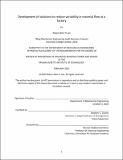Development of solutions to reduce variability in material flow at a factory
Author(s)
Lee, Robyn Wen-Yi.
Download1251803662-MIT.pdf (1.692Mb)
Other Contributors
Massachusetts Institute of Technology. Department of Mechanical Engineering.
Advisor
Stephen C. Graves.
Terms of use
Metadata
Show full item recordAbstract
This thesis focuses on improving the flow of material in an analytical instrument company, the Waters Corporation. One main pain point experienced at Waters is an observed uneven distribution in when instruments were completed throughout the work week. In addition, limitations in the number of instruments that can be transported between the assembly area and the packaging department and packaged in a given work day resulted in the formation of a bottleneck at the site of transportation (a inter-floor conveyor belt). These limitations result in an inability to package and deliver all instruments produced within a given work week, causing a backlog of unpackaged instruments which spill over into the next work week. The aim of this project is to identify and develop solutions to the underlying issues causing the uneven material flow and bottleneck. From the investigation, I identified two causes of the uneven flow. The first was a lack of incentive to build instruments one piece at a time. The second was that there were frequent delays in part delivery from external suppliers and internal processes, namely the machine shop, which delayed the completion of individual instruments and encouraged batching. From this, it was identified that one cause of the bottleneck in the conveyor belt was that items other than instruments, primarily empty bins, were also being transported using the conveyor belt. To target these issues, I developed and analysed a number of solutions. The solutions ultimately selected were to utilize a daily quota schedule to incentivize producing instruments one piece at a time. Solutions targeted at reducing shortages in parts produced by the machine shop included holding increased safety stock to decrease the impact of uncertainties in the production of parts at the Waters machine shop and re-evaluating the scheduling system chosen for each part. These solutions, when combined, should result in a more even distribution of instrument completion throughout the workweek, reducing the observed build-up of instruments.
Description
Thesis: M. Eng. in Advanced Manufacturing and Design, Massachusetts Institute of Technology, Department of Mechanical Engineering, February, 2021 Cataloged from the official PDF of thesis. "February 2021." Includes bibliographical references (page 75).
Date issued
2021Department
Massachusetts Institute of Technology. Department of Mechanical EngineeringPublisher
Massachusetts Institute of Technology
Keywords
Mechanical Engineering.